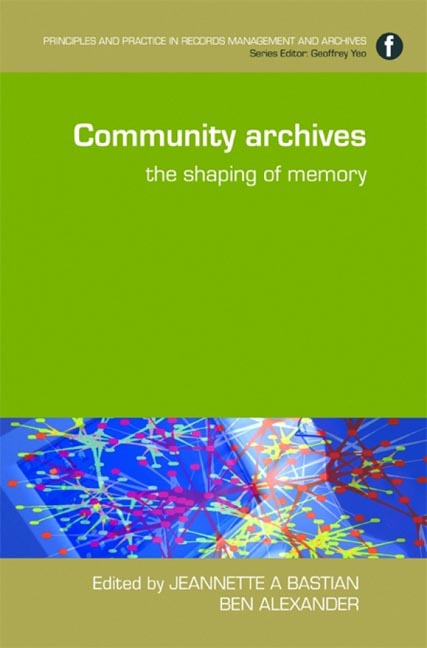Book contents
- Frontmatter
- Contents
- Introduction to the series
- Acknowledgements
- Contributors
- Introduction: Communities and archives – a symbiotic relationship
- Part 1 A community archives model
- Part 2 Communities and non-traditional record keeping
- 3 The Single Noongar Claim: native title, archival records and aboriginal community in Western Australia
- 4 Oral tradition in living cultures: the role of archives in the preservation of memory
- 5 We are our memories: community and records in Fiji
- Part 3 Records loss, destruction and recovery
- Part 4 Online communities: how technology brings communities and their records together
- Part 5 Building a community archive
- Conclusion: The archivist and community
- Bibliography
- Index
- Miscellaneous Endmatter
- Miscellaneous Endmatter
- Miscellaneous Endmatter
5 - We are our memories: community and records in Fiji
from Part 2 - Communities and non-traditional record keeping
Published online by Cambridge University Press: 08 June 2018
- Frontmatter
- Contents
- Introduction to the series
- Acknowledgements
- Contributors
- Introduction: Communities and archives – a symbiotic relationship
- Part 1 A community archives model
- Part 2 Communities and non-traditional record keeping
- 3 The Single Noongar Claim: native title, archival records and aboriginal community in Western Australia
- 4 Oral tradition in living cultures: the role of archives in the preservation of memory
- 5 We are our memories: community and records in Fiji
- Part 3 Records loss, destruction and recovery
- Part 4 Online communities: how technology brings communities and their records together
- Part 5 Building a community archive
- Conclusion: The archivist and community
- Bibliography
- Index
- Miscellaneous Endmatter
- Miscellaneous Endmatter
- Miscellaneous Endmatter
Summary
Fiji is a Pacific nation of 330 islands (a quarter of which are inhabited) lying at the heart of the ‘South Pacific’ midway between the equator and the South Pole. It has a population approaching 900,000 people, and archaeological evidence has established that the group of islands was probably first settled around three and a half thousand years ago (Yaqona, 2004, 10–11). As with most other former colonies, change has been a constant theme for our nation. The idea of nationhood is itself relatively new, unlike countries such as China, Japan, France or Egypt, which have a long and colourful record of nationhood.
We in Fiji, on the other hand, were originally a collection of variously structured kin groups headed by chiefs who contested for predominance within their immediate areas. The more successful chiefs sought to extend their power and influence as far as possible.
After a number of failed attempts at centralized government, and under the growing threat of increasingly disruptive elements within the settler community, the leading chiefs of the time decided to cede Fiji to Britain and on 10 October 1874 Fiji became a crown colony of Britain (Lal, 1992, 10–11). A mere 96 years later, on 10 October 1970, after considerable growing pains and earnest dialogue among Fiji's communities and the British, Fiji became an independent nation.
For the last 150 years, the people of Fiji have had to deal with great waves of change, and challenge. This becomes especially clear when dealing with issues such as culture, identity and what seems to be competing perceptions of knowledge. Against this backdrop archives and records managers are struggling to implement relevant, effective record-keeping systems in a society that is losing parts of its traditional heritage, and is not yet convinced of the need to manage records over time. What then are the challenges to retaining our memory? What role do archives play? And where do we go from here?
Oral tradition is the synthesis and transmission of knowledge and histories in a community from one generation to the next. The approach is not about ‘data’ or ‘facts’ that are captured in the ‘formal record-keeping environment’, but rather it is a knowing which comes from doing and sharing.
- Type
- Chapter
- Information
- Community ArchivesThe shaping of memory, pp. 87 - 94Publisher: FacetPrint publication year: 2009
- 3
- Cited by



